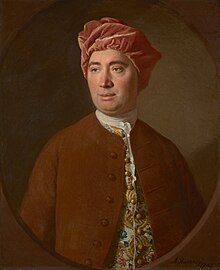
Back David Hume Afrikaans ዴቪድ ሁም Amharic David Hume AN ديفيد هيوم Arabic ديڤيد هيوم ARY ديفيد هيوم ARZ David Hume AST Devid Yum Azerbaijani Дэвід Юм Byelorussian Дэйвід Г’юм BE-X-OLD
David Hume | |
|---|---|
 Portrait by Allan Ramsay, 1754 | |
| Born | David Home 7 May NS [26 April OS] 1711 Lawnmarket, Edinburgh, Scotland |
| Died | 25 August 1776 (aged 65) New Town, Edinburgh, Scotland |
| Education | University of Edinburgh |
| Era | 18th-century philosophy |
| Region | Western philosophy |
| School | |
Main interests | |
Notable ideas | |
David Hume (/hjuːm/; born David Home; 7 May 1711 – 25 August 1776) was a Scottish philosopher, historian, economist, and essayist who was best known for his highly influential system of empiricism, philosophical scepticism and metaphysical naturalism.[1] Beginning with A Treatise of Human Nature (1739–40), Hume strove to create a naturalistic science of man that examined the psychological basis of human nature. Hume followed John Locke in rejecting the existence of innate ideas, concluding that all human knowledge derives solely from experience. This places him with Francis Bacon, Thomas Hobbes, John Locke, and George Berkeley as an empiricist.[7][8][9]
Hume argued that inductive reasoning and belief in causality cannot be justified rationally; instead, they result from custom and mental habit. We never actually perceive that one event causes another but only experience the "constant conjunction" of events. This problem of induction means that to draw any causal inferences from past experience, it is necessary to presuppose that the future will resemble the past; this metaphysical presupposition cannot itself be grounded in prior experience.[10]
An opponent of philosophical rationalists, Hume held that passions rather than reason govern human behaviour, famously proclaiming that "Reason is, and ought only to be the slave of the passions."[7][11] Hume was also a sentimentalist who held that ethics are based on emotion or sentiment rather than abstract moral principle. He maintained an early commitment to naturalistic explanations of moral phenomena and is usually accepted by historians of European philosophy to have first clearly expounded the is–ought problem, or the idea that a statement of fact alone can never give rise to a normative conclusion of what ought to be done.[12]
Hume denied that humans have an actual conception of the self, positing that we experience only a bundle of sensations, and that the self is nothing more than this bundle of perceptions connected by an association of ideas. Hume's compatibilist theory of free will takes causal determinism as fully compatible with human freedom.[13] His philosophy of religion, including his rejection of miracles, and of the argument from design for God's existence, were especially controversial for their time. Hume left a legacy that affected utilitarianism, logical positivism, the philosophy of science, early analytic philosophy, cognitive science, theology, and many other fields and thinkers. Immanuel Kant credited Hume as the inspiration that had awakened him from his "dogmatic slumbers."
- ^ a b Cite error: The named reference
SEPwas invoked but never defined (see the help page). - ^ Fumerton, Richard (21 February 2000). "Foundationalist Theories of Epistemic Justification". Stanford Encyclopedia of Philosophy. Retrieved 19 August 2018.
- ^ Demeter, Tamás (2016). David Hume and the culture of Scottish Newtonianism : methodology and ideology in Enlightenment inquiry. Brill. ISBN 978-90-04-32731-3. OCLC 960722703.
- ^ David Bostock, Philosophy of Mathematics: An Introduction, Wiley-Blackwell, 2009, p. 43: "All of Descartes, Locke, Berkeley, and Hume supposed that mathematics is a theory of our ideas, but none of them offered any argument for this conceptualist claim, and apparently took it to be uncontroversial."
- ^ The Problem of Perception (Stanford Encyclopedia of Philosophy): "Paraphrasing David Hume (1739...; see also Locke 1690, Berkeley 1710, Russell 1912): nothing is ever directly present to the mind in perception except perceptual appearances."
- ^ David, Marian (3 October 2018). "The Correspondence Theory of Truth". In Zalta, Edward N. (ed.). The Stanford Encyclopedia of Philosophy. Metaphysics Research Lab, Stanford University – via Stanford Encyclopedia of Philosophy.
- ^ a b Atherton 1999, p. ?.
- ^ Cranston, Maurice, and Thomas Edmund Jessop. 2020 [1999] "David Hume." Encyclopædia Britannica. Retrieved 18 May 2020.
- ^ Harris, M. H. 1966. "David Hume". Library Quarterly 36 (April): 88–98.
- ^ Berlin, Isaiah (2013). The Roots of Romanticism (2nd ed.). Princeton: Princeton University Press. ISBN 978-0691156200.
- ^ Hume 1739, p. 415.
- ^ Cite error: The named reference
:6was invoked but never defined (see the help page). - ^ "Hume on Free Will". stanford.edu. Metaphysics Research Lab, Stanford University. 2016.